CONVERSATIONS WITH SAI
Satyopanishad - Part 23
Direct Directions from the Divine
Dear Reader,
In response to your positive feedback to this section where we have a conversation with the Divine, we continue with Prof. Anil Kumar’s ‘Satyopanishad’ following Dr. John Hislop’s series ‘Conversations with Bhagavan Sri Sathya Sai Baba’ that ended in January 2008.
This series is also in the question-answer format that many devotees prefer, and has answers from Bhagavan on topics as wide ranging as the origin of evil, the goals of human life, and aspects of God – embodied and formless, to price hikes, women’s liberation, vegetarianism, and the generation gap among people of the present times.
Published in two parts by the author, these volumes have 270 questions in all, which are neatly grouped under separate chapters. In this issue, we continue chapter seven, “Sadhana, The Inner Door”.
CHAPTER VII:
Sadhana, The Inner Door
Prof. Anil Kumar: Swami! How can we realise the divinity within us?
Bhagavan: Look! In college, you have elective subjects like M.P.C (Mathematics. Physics and Chemistry), B.P.C (Biology, Physics and Chemistry) and so on, haven't you? Similarly, to realise the divinity within you, you have to take a group of three subjects. They are bhakti (devotion), gyana, (wisdom) and vairagya (renunciation).
Without devotion, you can't acquire wisdom - Bhakti leads to gyanam. Without wisdom you can never develop detachment or renunciation. Wisdom takes you to renunciation. A flower, after a while, turns into an unripe bitter fruit, which ultimately becomes a sweet ripened one, doesn't it? It is a question of time that brings about the change. Devotion transforms itself into the wisdom that leads to detachment. This detachment helps you in visualising the divinity within yourself. The fruit then drops down from the tree of life. Gyana (wisdom) contributes to sharanagati, surrender.
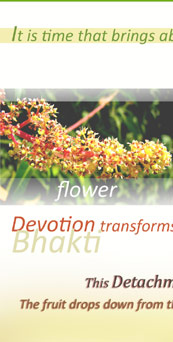 |
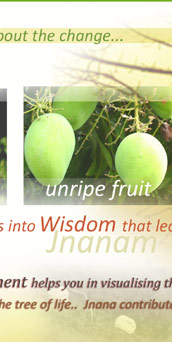 |
 |
 |
You should remember one point here. Gyana, Japa, Yagna (Wisdom, chanting and performing sacrifices) are not important as such. Your love for God is more important than any other such rituals for success in spiritual pursuit.
Intense love for God is bhakti, devotion. Knowledge, broadly speaking, is of two types: one is physical, which is secular, material and worldly knowledge, while the other is spiritual, which is metaphysical, transcendental and divine knowledge. Spiritual knowledge is non-dual, and helps the seeker to realise and experience his/her own divinity.
: Swami! How are we to attain bliss?
: It is a pity to find many a confused and disturbed person even in the spiritual field. Though a person is in an ashram or a spiritual centre, he/she undergoes shrama, suffering. It is a matter of shame if a person calls himself or herself a devotee without following a single teaching or practicing it for his transformation. The life of a devotee should be pure, calm, peaceful, and detached, and he should pine for the knowledge and experience of the Self, or the spirit, or the atma. Infinite desires, meaningless worries and anxieties to get all that one doesn't really deserve are obstacles in spiritual life. That is why many don't enjoy divine bliss. Body attachment makes things much worse.
You should cultivate four main qualities which are the prerequisites of a devotee of God. The first one is maitri, friendship, second, karuna, compassion, the third mudita, feeling happy at others' progress, and the fourth quality is upeksa, detachment. |
Four qualities are very essential for the attainment of divine bliss: samam-damam that is, control of the outer and inner senses, trupti, which is contentment, vicharana or enquiry, and satsang or good company. They confer divine bliss on the seeker. You have got to know how this most valuable divine bliss is contained within the human body, which is itself transient, and is of lesser value than the spirit.
The body is composed of two bucketfuls of water, one bucketful of lime, a quantity of iron that equals four two-inch nails, the amount lead used in six pencils, phosphorous contained in nine hundred and twenty matchsticks, and the fat held in four Lux soaps. Herein lies the atma, the divine spirit. Divine bliss can be attained by investigating, realising and experiencing the inner core of this body, viz. atma.
Swami! Many spiritual practices are suggested, such as, namasmarana, that is, singing the glory of God, dhyana or meditation, puja or worship, etc. But, none of these confer total satisfaction. We are not able to practise and follow continuously even one of them. Dissatisfaction over not being able to succeed and frustration about not receiving the rewards for the little we do is overpowering us. Why does this happen? Kindly show us the way.
Bhagavan: You have to plough the land, remove the weeds, manure and water it. Isn't it so? Without tilling the land, removing the weeds and watering, even if you sow the best of seeds, will it be of any help? Similarly, if you want to achieve the four purusharthas, the four objectives of life (which are right conduct, prosperity, desire, liberation) you should follow any one of the nine paths of devotion, and adopt the eightfold path of yogic practices, that is, the astanga yoga. Follow the spiritual path scrupulously.
 |
 |
 |
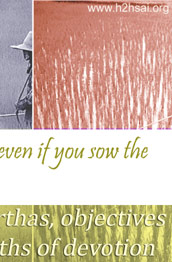 |
You should cultivate four main qualities which are the prerequisites of a devotee of God. The first one is maitri, friendship, second, karuna, compassion, the third mudita, feeling happy at others' progress, and the fourth quality is upeksa, detachment. These are necessary for spiritual advancement.
Maitri is the first one. If you are friendly to the higher-ups, there is every possibility that those people will put you under their control. If you are a friend to those who are inferior to you, there is every scope for you to dominate them. In either case, friendship will not continue long. Therefore, friendship must be among equals.
What you achieve in sadhana is the removal of the veil blocking the vision of the Self, the veil of anatmatabhava. With the removal of this veil, the experience of the atma, the Real, stands revealed. This is not something that has to come from somewhere, nor is it something that can be lost. |
Karuna is the second one. You can't be compassionate towards all. Be compassionate towards the poor, the needy, the less fortunate, the handicapped and the sick as well as those who are less educated than you and are inferior to you in rank, position and property. If you do so, your compassion will be valued most and it will deepen increasingly.
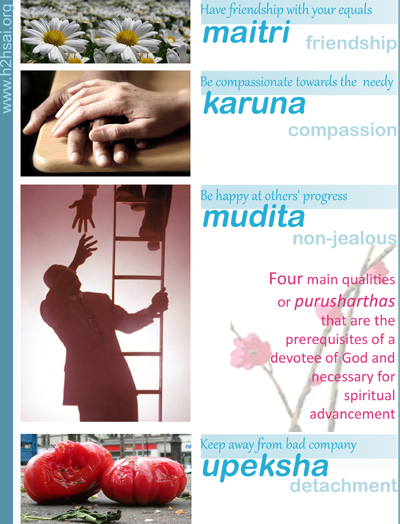 |
|
Mudita is the third one. You should not feel jealous of those who are better off than you. You should not have any bad feelings towards those who are more fortunate than you. You should, on the other hand, feel even happier at their progress and advancement. This is mudita.
The fourth one is upeksa. The opposite of upeksa is apeksa. Apeksa means attachment. Upeksa means detachment.
You should never be positively disposed towards bad people. You should not support designers of evil, or those who indulge in bad deeds. You should never develop friendship with an evil-minded person, or a person with bad behaviour. With these four qualities you can achieve the objectives of life, the purusharthas. Hence, be friendly with your equals, compassionate towards the poor and needy, be happy at others' progress and keep away from bad people. In fact, these four qualities may be said to be the objectives of life, the purusharthas.
To cultivate them, purity of heart is necessary. To feel that the very same one God is present in all living creatures and living beings is the way to develop purity of heart. You have to purify your tamasika, bestial qualities and rajasika, emotional or passionate nature. You have to develop that kind of steadiness and purity of mind and heart.
You will not be able to see clearly the reflection of the Sun or of the moon alike in containers filled with different kinds of water. One container may have very dirty water where you can't see the reflection of the Sun or the moon clearly. This is how the tamasika quality acts, cutting you off from reality. In another container, water may be found shaking and not still. Then also the reflection of the Sun will be unclear. This is the rajasika quality. But, a container filled with pure water, which is also steady, helps you to see the object reflected clearly in it. This is the effect of sattvika quality. Similarly, though the same atma is present in all, you are not able to recognise and experience it due to the differences in your body, mind and intellect.
Then, the question is how to achieve the pious quality or sattvika nature and the purity of heart or chittashuddhi to recognise and experience awareness of atma? He who can find out his own faults and others' merits can keep his heart steady and pure. If you can identify your own mistakes and rectify them, it doesn't matter wherever you are.
 |
|
Take a simple example. Your room may be full of mosquitoes. But if you have a mosquito net you will not be affected by their presence and you can sleep well. On the other hand, if there are mosquitoes inside the net, how can you sleep? Whose mistake is it? Similarly, see that there are no mistakes in you. Always remember that sadhana is intended for devotion and steadfastness. Sadhana done for selfish gains will be of no use and it can never give you bliss, peace and satisfaction. You can't do sadhana in such a case intensely and fervently.
Two things are with God only and are not present elsewhere. What are they? They are Bliss and Peace. True devotion is what urges you to pray to God for these two divine assets. |
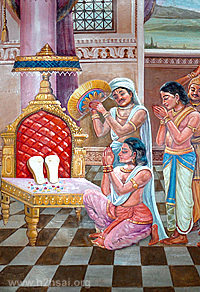 |
|
The Ramayana explains this very clearly. After his return from his uncle Kekaya's kingdom and on coming to know of the death of his father, King Dasaratha, Bharata approached his mother Kaikeyi and asked her about the reason for his death. Kaikeyi said, “My dear son, I am responsible for the king's death. For your benefit and to make you the king of Ayodhya, I asked your father to grant me the two boons he had promised to give me a long time ago. As the first boon, I asked that you be crowned, and as the second, Rama be sent to the forest. Your father couldn't bear the separation from Rama and so he died”.
On listening to this, Bharata became very furious. He said, “Oh! Wicked woman! Do you know what you did? Are you foolish? Do you think that you can cut off a tree and plant its branches to grow? Don't you know that Rama is a tree?" In her view Kaikeyi was right in doing that but to Bharata it was very cruel. Today, what you are doing is exactly like that. You are cutting off the tree of divinity and planting the branches of prakruti, nature. This is not proper. So, any sadhana is useless if there is no devotion supported by steadfastness. Without these basic qualities of maitri, karuna, mudita and upeksa you can't achieve anything. You can't have peace, bliss and self-satisfaction. Therefore, for a spiritual life you should acquire these four qualities.
Prof. Anil Kumar: Swami! Many spiritual paths are mentioned by diverse traditions and religions. How far can these paths lead to experiencing divinity? To what extent are their spiritual exercises to be adopted? From the description of some of these, success in one lifetime appears impossible. On the other hand, the worry that no spiritual practice is undertaken plagues us. Is there no way out for us? Kindly grant us peace.
Bhagavan: Listening to your accounts of sadhana, it appears you do not know what sadhana is. The practices you call 'spiritual' are undertaken by the mind. They give you only temporary happiness and satisfaction. On the other hand, they cannot be dismissed as altogether useless. Sadhanas must help you in spending your time in a pious way. What, then, is sadhana? "Sa” means salokyam, dwelling in heaven with the vision of God; therefore sadhana gives us the dhana, treasure, of salokyam. Every act of the mind is dualistic, artificial, and transient.
Jnana, wisdom, neither comes nor goes. You are the embodiment of Divyajnana, divine wisdom. Your own worldly attachments, sensual pleasures, and bodily identification obscure this awareness or wisdom. Once you realise it; you will never lose the state of awareness. |
Suppose you are on a journey, and also that there is a thief by your side. How can you feel secure? In the same way, all practices involving the mind can never give you unbroken bliss, the experience of Brahman. What you achieve in sadhana is the removal of the veil blocking the vision of the Self, the veil of anatmatabhava. With the removal of this veil, the experience of the atma, the Real, stands revealed. This is not something that has to come from somewhere, nor is it something that can be lost.
The next question is: how long does sadhana need to be practiced? Consider a wound. When healing starts, a scar appears covering the wound, and this drops off by itself. Suppose, you peel it off by force, then the wound grows bigger. In the same way, once you have the experience of the Self, the question of sadhana does not arise.
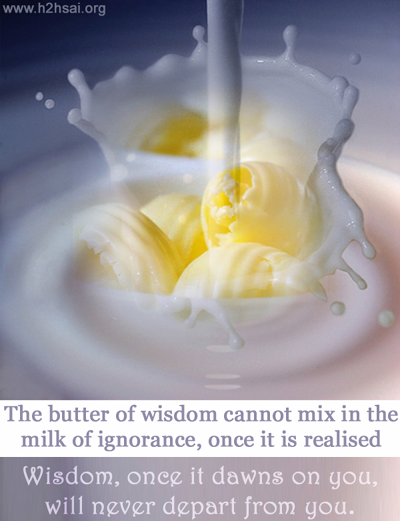 |
|
Here is another example. When you cook food, you adjust the flame. When you ask how long the flame is to be turned on, it is only till the food is cooked. Sadhana too is necessary only till one acquires jnana, or supreme wisdom.
Prof. Anil Kumar: Swami! When we get wisdom based on our practical knowledge, discrimination and determination, will it stay with us permanently or is there any possibility of our losing it by chance leading us back to ignorance again?
Bhagavan: That is impossible. Actually, you can't call it wisdom at all, if it is lost. You can't consider a person a man of wisdom if he returns to the same old state of ajnana, ignorance.
In fact, jnana, wisdom, neither comes nor goes. You are the embodiment of Divyajnana, divine wisdom. Your own worldly attachments, sensual pleasures, and bodily identification obscure this awareness or wisdom. Once you realise it; you will never lose the state of awareness.
A simple example: you curdle milk and churn it to get butter. The butter, a product of milk, will never get mixed in the milk once again, will it? So also, the butter of wisdom cannot mix in the milk of ignorance once it is realised. Similarly, though a man of wisdom lives in the midst of ignorant people, he will never lose his gyana or wisdom. Ajnana, or ignorance will never come again. Wisdom, once it dawns on you, will never depart from you.
Prof. Anil Kumar: Swami! Is bodily feeling an obstacle to spiritual progress? The bodily feeling doesn't seem to leave us anyway. Kindly tell us what we should do about it?
Bhagavan: I have never told you to neglect your body. Always remember that the body is an instrument. A temple may be very beautiful, clean and highly attractive. However, you will not be satisfied by merely looking at it from outside, unless you go in and see the idol installed at the sanctum sanctorum. It is the idol that makes you feel happy and ecstatic, doesn't it? Similarly, your body is the moving temple of God. You should never neglect it. Your desires will not make your body polluted. The only thing is that the desires need to be good and never bad.
So long as one is selfish, self-centered, sensual and worldly, the body definitely is an obstacle to spiritual progress. But if you take it as an instrument for the realisation of the divinity within yourself then it is definitely not an obstacle. |
We have on one side, the six foes, such as lust, anger, greed, attachment, avarice, and hatred, which ruin man. But you can channelise them in the right direction. For example, take anger. It does you no good at any time. But if you are angry with your bad behaviour, wicked thoughts and evil tendencies, you will improve yourself. So, don't be angry with anyone, be angry with your own anger. Then, consider desire. If you are after limitless desires, you will be leading a discontented life. On the other hand, if you desire God, and wish to serve him, the very desire, kama, becomes sublime.
Therefore, so long as one is selfish, self-centered, sensual and worldly, the body definitely is an obstacle to spiritual progress. But if you take it as an instrument for the realisation of the divinity within yourself then it is definitely not an obstacle. Hiranyakasipu, Hiranyaksha, Ravana, Kumbhakarna, Sisupala, Jarasandha, Dantavaktra, etc., ruined themselves because of their bad thoughts, wicked actions, cruel and harmful nature. In fact, the body is the gift of God for man to realise and experience Him.
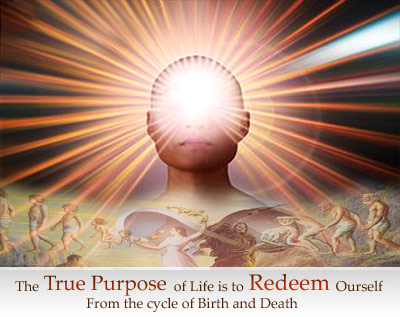 |
|
Prof. Anil Kumar: Swami! How are we to grasp easily the purpose and aim of life?
Bhagavan: This is very simple. A small example: A patient takes medicines for an ailment and gets cured. But he has to take medicines regularly for a certain period of time so that he may not have to take medicines once again by falling sick. It means he should not be a patient a second time.
Similarly, your birth in this life is given to you not to be born again. In other words, you should not enter the cycle of birth and rebirth repeatedly. One has to work for it spiritually by intense sadhana during this lifetime itself. This is the aim and the purpose of life.
Prof. Anil Kumar: Swami! What is meant by 'quest for truth'? How are we to go about this noble task?
Bhagavan: To say that one is involved in the process of search for truth is foolish and is a sign of ajnana, ignorance. When satya, truth, is everywhere, what is the point of searching for it? Truth is God. God is truth. God is omniscient. So also truth is everywhere.
God, the Eternal Truth, has created the whole universe, and this universe will merge ultimately in truth. This is the eternal truth.
With your eyes you look at your children. With the same eyes you see your wife too. Your eyes may be the same but your vision, the way you look at different persons such as your mother, wife, and children vary. The feeling with which you look at everyone is the spirit of the search for truth. This distinguishes feelings from looks.
Truth is God. God is truth. God is omniscient. So also truth is everywhere. |
The Search for truth should answer questions like what, when, why, whom, where and how?
Prof. Anil Kumar: Swami! Nowadays even devotion has become a matter of convenience and business, and is expected to yield quick results. Isn't this wrong in the path of devotion? Are cunning and craft fruitful in devotion?
Bhagavan: Today, whatever one does and says is all out of only selfishness. If you develop devotion for getting a job, you are devoted to your employer and not to God. If you are a devotee with a view to get married, you are devoted to your wife or husband as the case may be, but not to God.
If you notice clearly, you will know there is enough money in this world. There are many in good positions. There are several influential and reputed people. Should you pray to God for money, positions, popularity, and influence which are already available in this world plentifully? You should pray to God for those which are not available here and are present in and with Him only. Two things are only with God and are not present elsewhere. What are they? They are Bliss and Peace. True devotion is what urges you to pray to God for these two divine assets.
 |
Most unfortunately, today people employ even tricks, backdoor methods and logic in spiritual fields. Alas! They will never yield good results. Such people will never succeed. Actually these boomerang. God and Mammon can't go together. You can't buy or sell God. Business on commercial principles and God never go hand in hand. God doesn't want your dhana, money or wealth. He looks into your dharma, conduct.
Alas! In the name of spirituality, it is very unfortunate that people deceive each other, involve in financial transactions, politicise, manipulate, cheat, scheme, plot, spend time in gossip and mud slinging activities. Your knacks, tricks and gimmicks will never work with God. You will never realise God through these tactics.
A path followed with your total virakti, detachment, your saktii, total capacity and your anurakti, total love for God is bhakti, and not yukti, the tricks you adopt. |
Here is a small story. A very rich man had a pet dog. One day when a person was passing along the road, this dog chased him and was about to bite him. Then the person, being totally helpless, hit the dog with his stick. The dog died. This made the rich man very furious and he took the matter to court to sue this person. There in the court the judge asked the passerby as to why he had hit the dog resulting in its death. The person said, “Sir! It fell upon me and was about to bite me. I couldn't do anything. So, I had to hit it with the stick in my hand and unfortunately the dog died”.
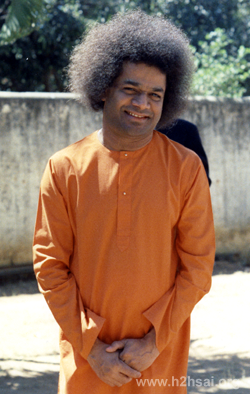 |
|
Then the judge asked the rich man what he would say in the matter. He said, “Sir! I can understand the situation. But, why should he hit it on the head? Had he not done so, the dog wouldn't have died”. The judge turned to this person, wanting him to give the explanation. He said, “Sir! It was about to bite me with its teeth. So I had to hit it on the head. Had it tried to bite me with the tail, I would have certainly beaten its tail”. So this is a knack or a trick to escape from the situation. These things are of no use in the spiritual path.
Another example, a businessman had to go to a neighbouring town on some business. He called his son and said, “My dear son! You please look after my work carefully until I return. Be vigilant. Son! You know I do daily puja. You also see me doing astottara puja, repeating the 108 precious names of God. You do it without fail during my absence. I don't want you to discontinue”.
The son said, “O.K. father! I will scrupulously follow your instructions”. On his return the businessman enquired of his son if he had done all the things assigned to him including the astottara puja.
The son had shown him a paper as proof of his compliance. There, on the paper his son wrote God's holy name and marked 'ditto, ditto' (dodo) so that he did not have to repeat 108 times. Would this make a genuine astottara puja? Do you expect any positive results out of such tactics?
Once, a merchant went to a Guru and reverentially prayed to him to give him mantra upadesha (initiation into a mantra), to attain liberation, moksha. Then,the merchant said, “Sir! Can I ask my assistant to repeat and chant the mantra a thousand times on my behalf?" The Guru said, “It is useless. What are you talking about? How do you expect to be benefited when your assistant does the puja on your behalf? Do you ever ask him to eat when you are hungry?
Do you ever ask him to drink water when you are thirsty? Do you ever ask him to go to a doctor and take medicine when you are sick? What nonsense are you talking?" This seems to be the trend in the thinking among modern seekers and aspirants, this is not bhakti, devotion.
A path followed with your total virakti, detachment, your sakti, total capacity and your anurakti, total love for God is bhakti, devotion, and not yukti, the tricks you adopt.
Dear Reader, did this article inspire you in any way? Would you like more of such conversations with the Divine? Please share with us your reflections by writing to h2h@radiosai.org mentioning your name and country. Thank you for your time.
Heart to Heart Team





